

Digital Literacies. Remarkable - Who's moving to Finland with us? #BeRemarkable.
Digital Storytelling. Flipped Classroom. Good Examples. Knowmads. Online Learning. Open Educational Resources. Others' Pearltrees. Serious Games. Technology and Education. Web2 tools. Where Industry Discovers Geospatial Image Analysis. Louisville, home of the Kentucky Derby, great food, and this year's 2014 ASPRS annual conference.
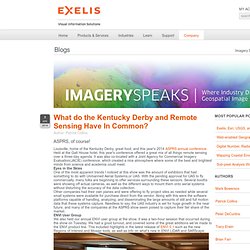
Bloom's Critical Thinking Questions to Use in Class. Raising Awake Children in a Broken School System. By Nanice Ellis.
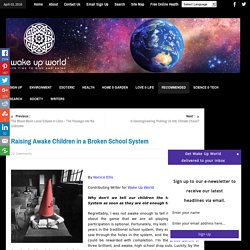
71_solidar_briefing_final.pdf. Student Success Infographics. Students love rich useful feedback.
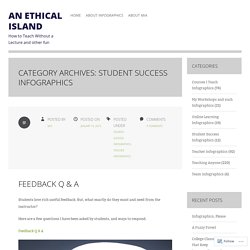
But, what exactly do they want and need from the instructor? Blogs. October 14, 2017 - Politics & Policy+ Politics & Policy (10) Education and the Media.
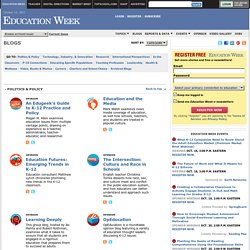
A Collection Of The Best Education-Related “Most Popular” Lists For 2014. With the end of the year rapidly approaching, many educators and organizations are putting together various “most popular” lists.
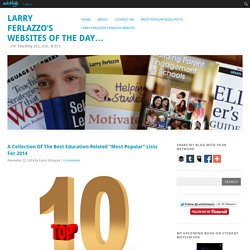
I thought I’d bring together the best of them in one place, and will be continuing to add to this post over the next couple of weeks. Learning in the Social Workplace. The death of universities. Are the humanities about to disappear from our universities?
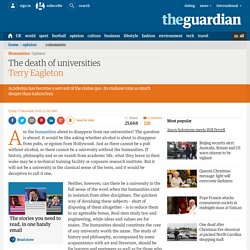
The question is absurd. Teaching Children How to Think Instead of What to Think. Right now our education system is doing more to indoctrinate our children than to educate them.
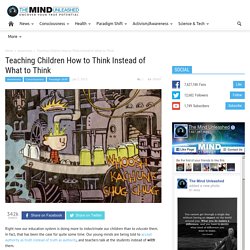
In fact, that has been the case for quite some time. Our young minds are being told to accept authority as truth instead of truth as authority, and teachers talk at the students instead of with them. Teachers have become repeaters of information. Teacher Infographics. Students love rich useful feedback. But, what exactly do they want and need from the instructor? Here are a few questions I have been asked by students, and ways to respond. Feedback Q & A Like this: Science Education - All Issues. MIT educator stresses need to integrate arts and humanities in science education - National Higher Education. In the past 50 years, technology development has changed the way elementary school children learn, in large measure thanks to a national emphasis on science, technology, engineering and mathematics learning, or STEM.
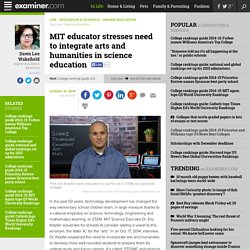
MIT Science Educator Dr. Eric Klopfer would like for schools to consider adding a vowel to this acronym, the letter ‘A,’ for the “arts.” In an Oct. 17, 2014, interview, Dr. Klopfer explained the need to incorporate arts and humanities to develop more well-rounded students to prepare them for college study and future careers.
Why 21st century skills are not that 21st century. Whenever I hear anyone talk about preparing students for the 21st century, I am always sceptical.
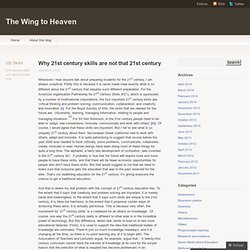
Partly this is because it is never made clear exactly what is so different about the 21st century that requires such different preparation. For the American organisation Partnership for 21st Century Skills (P21), which is sponsored by a number of multinational corporations, the four important 21st century skills are ‘critical thinking and problem solving; communication, collaboration; and creativity and innovation.’ Ten Skills for the Future Workforce. Ten Skills for the Future Workforce Sense-making, social intelligence, novel & adaptive thinking, cross-cultural competency, computational thinking, new-media literacy, transdisciplarity, design mindset, cognitive load management, virtual collaboration.
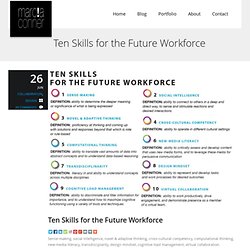
These are the 10 skills needed for the future workforce. For a full report, see the work done by the Institute for the Future with Apollo Group looking at the Skills Needed by 2020 (also available on the IFTF website). A summary map is also available. The related, Shape of Jobs to Come: Possible New Careers Emerging from Advances in Science and Technology (2010 – 2030) full study from FastFuture is also very insightful (summary of study). I Will Not Let An Exam Result Decide My Fate. RSA Animate - Changing Education Paradigms. The 7 Powerful Idea Shifts In Learning Today. By Terry Heick, TeachThought.com : Shift_Learning: The 7 Most Powerful Idea Shifts In Learning Today So we’re taking a stand here. This is all incredibly subjective, but so are the VH1 Top 100 Hair Bands Videos and those are fun, am I right?
So subjective it is. Let’s make a list. A list of ideas that are truly transformational. Hackschooling Makes Me Happy: Logan LaPlante at TEDxUniversityofNevada. Who Owns the Future? by Jaron Lanier – review. Jaron Lanier, groundbreaking computer scientist and infectious optimist, is concerned that we are not making the most of ourselves. In Who Owns the Future? The c MOOC as knowledge ecologies. Thanks to Stephen Downes for the reference to Dr.
Mohamed Amine Chatti’s Knowledge Management: A Personal Knowledge Network Perspective. Here are some abstracts that I would like to quote: Knowledge ecologies are thus self-controlled and self-contained entities. Knowledge ecologies lacked a shared repertoire and are thus open and distributed knowledge domains.The result of participation in a knowledge ecology is a restructuring of one’s PKN, a reframing of one’s theories-in-use and an extension of one’s external network with new tacit and explicit knowledge nodes; i.e. people and information (external level)Knowledge ecology is a more general concept than intensional networks.In essence, a knowledge ecology is a complex adaptive system that emerges from the bottom-up connection of PKNs.
That is a wonderful analysis of knowledge ecology, with a model of Knowledge Management based on Personal Knowledge Network perspective. Hacking The Academy: Leslie Chan at TEDxUTSC. Philip Zimbardo: The psychology of time. Essential Humanities. Project-Based Learning. Patterns: Learning, Thinking, Creating. By Kevin Washburn, on January 10th, 2012 It seems contradictory. The brain seeks and sees patterns, but when asked to find patterns, many people become uneasy. Future Learning Short Documentary. Project Based Learning. 15 Tools For Better Project-Based Learning. Project Based Learning Resources. På jakt efter skolpolitisk fantasi. Elevernas syn på skolan. Is Education Killing Creativity? 15 OER tools for educators. Snabbkurs för Tomas Tobé och andra som inte hunnit sätta sig in i de senaste 20 årens forskning om bedömning i skolan.
40 Alternative Assessment Ideas for Learning. All About Inquiry-Based Learning. Classroom Management: Using Gaming Elements. Hyper Island Blog. 27 Ways To Increase Student Engagement In Learning. The Innovative Educator. Free Technology for Teachers. iLearn Technology. Maker Movement Reinvents Education. InBloom. Make learning an adventure. Study: Swedish boys learn English from World of Warcraft. ‘Distraction Is on the Syllabus’: Poet Explains Why He’s Teaching a Penn Class Called ‘Wasting Time on the Internet’
Teaching Aids in Visual Communication and Writing: Sample Syllabi, Sample Assignment Descriptions, Online Quizzes, and More! Why Ugly Handouts Are Bad for Teachers (and everyone else) Dealing with Uncertainty: Why Reaching out to Young People Is So Important. Category:Active Learning. The Teacher-as-Learner - TITLE PAGE.